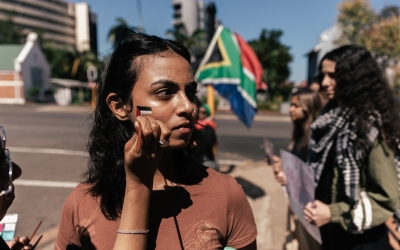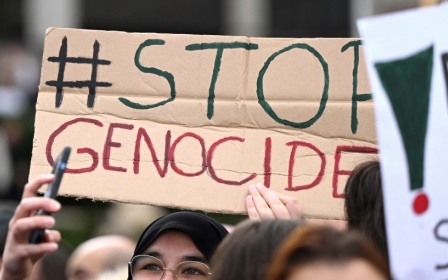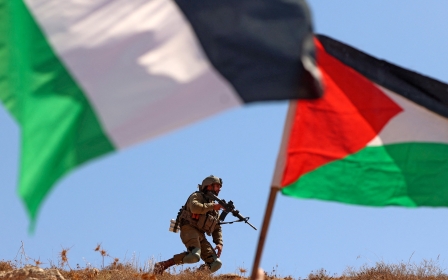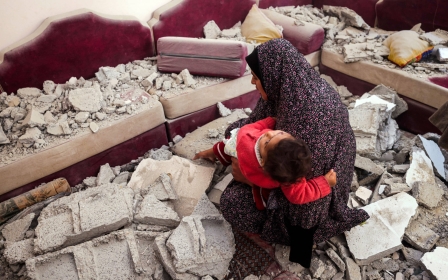Aharon Barak: Israel's judge at the ICJ who 'legitimised occupation'
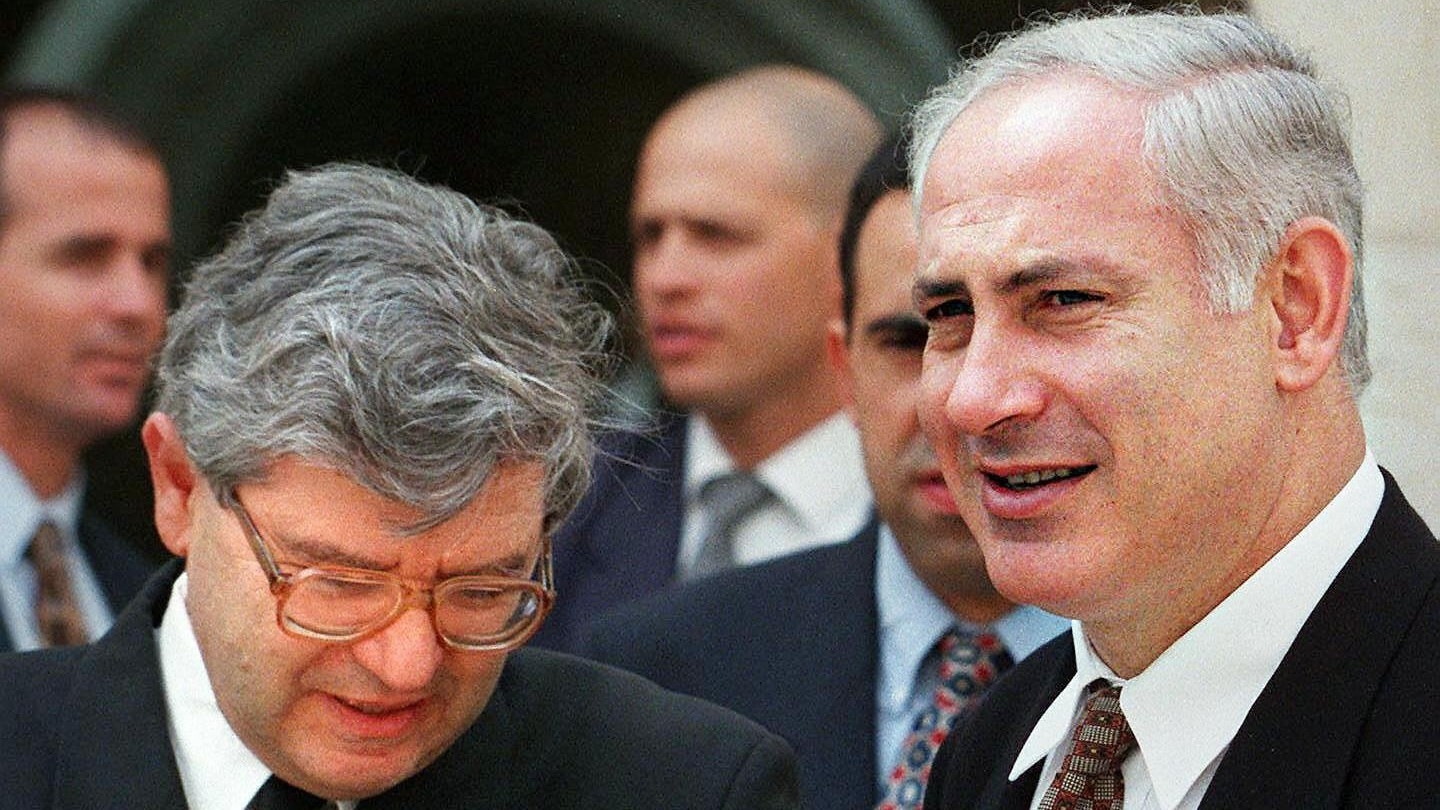
The Israeli government has appointed Aharon Barak, the former head of its Supreme Court, to the panel of judges that will hear South Africa’s case accusing Israel of genocide in Gaza at an International Court of Justice (ICJ) hearing later this week.
In addition to the 15 judges on the permanent panel at the Hague-based court, the two parties to a case are also able to nominate a judge to take part in the deliberation. Decisions are taken by a simple majority.
In an 84-page application, South Africa said Israel's actions in Gaza were "genocidal in character because they are intended to bring about the destruction of a substantial part of the Palestinian national, racial and ethnical group".
The Palestinian death toll since war broke out on 7 October is nearing the 23,000 mark in the besieged enclave. The majority of those killed are women and children.
Barak’s appointment to the ICJ panel was personally approved by Prime Minister Benjamin Netanyahu, according to a report on Israel's Channel 12.
New MEE newsletter: Jerusalem Dispatch
Sign up to get the latest insights and analysis on Israel-Palestine, alongside Turkey Unpacked and other MEE newsletters
The 87-year-old jurist was born in Lithuania and is a survivor of the Holocaust. His parents moved to the British Mandate of Palestine in 1947, a year before the creation of the state of Israel.
He went on to embark on a distinguished academic and legal career, and served as Israel’s attorney general between 1975 and 1978, after which he began a three-decade tenure as a judge in Israel’s Supreme Court. In the last 11 of those years, he served as its president.
'Preserving the facade of Israeli democracy'
Barak has built up a reputation of being a liberal judge and a champion of democracy, particularly since his retirement.
In recent months, his strong opposition to the current Israeli government’s controversial judicial overhaul plans has earned him praise among opposition circles and criticism from the far right.
But researchers and commentators have called into question Barak's liberal and democratic credentials, citing his decades-long approach to cases involving abuses against Palestinians.
"For many, many years, and particularly since the massive demonstrations against the judicial coup alone, Barak has become the symbol of liberal democracy in Israel," Orly Noy, chair of Israeli rights group B’Tselem, told Middle East Eye.
"Now Israel is sending that symbol of the so-called democratic Israel to whitewash its crimes against Palestinians in Gaza."
Nimer Sultany, an academic in public law at Soas University in London, wrote a critical analysis of Barak's period as Supreme Court chief in a paper published in 2007, shortly after the jurist retired.
'It remains to be seen if he chooses to act as an attorney for Israel or as an impartial judge'
- Nimer Sultany, academic
“Barak’s record as a former chief justice of Israel’s Supreme Court is not liberal in any convincing way when one considers his rulings regarding Palestinians, whether Israeli citizens or residents in the occupied territories,” Sultany told MEE.
“His rulings compromised equality, affirmed the ethnocratic character of the state, and perpetuated the inferiority of non-Jewish citizens."
In 2004, the ICJ issued an advisory opinion deeming a separation wall built by Israel running through the occupied West Bank as being illegal. Under Barak's leadership, the Supreme Court refused to rule on the general legality of the wall.
Instead, Israel’s highest court rejected small parts of the wall being built in certain areas, whilst later approving the vast majority of its construction.
Almost 20 years later, the wall continues to cut through Palestinian land and communities despite the ICJ decision.
In the case of illegal Israeli settlements built on occupied Palestinian territory, contravening international law, the Supreme Court under Barak similarly provided few legal barriers.
“[Barak] is the most suitable man for the job because this is exactly the thing to which he dedicated his entire professional life: legitimising the crimes of Israel and the occupation…while preserving the facade of the Israeli democracy,” Noy said.
She cited the legitimisation of constructing the separation wall, expropriating land in the occupied West Bank to serve Israeli settlers, and targeted assassinations carried out by the Israeli military.
'Diplomat-judge' who supports ongoing war
Barak has widely been attributed as the foremost judge in Israel's history, and has taken on a role akin to being an international diplomat for the country.
“Aharon Barak is basically what people call a diplomat-judge: a judge who perceives his legal duty as protecting the agenda of his state through legal means and mechanisms,” Hassan Ben Imran, a board member at Law for Palestine, told MEE.
This role as “diplomat-judge” was further cemented when Barak reportedly admitted that the Supreme Court's judicial reviews had helped Israeli soldiers by making it difficult for them to be tried at the International Criminal Court.
His diplomatic credentials mean that domestic Israeli politics are put to one side.
"The Israeli elites were shocked by South Africa’s application. They have uncritically supported Israel’s war, and now they have an interest in denying that it is a genocide," said Sultany.
"The war had a unifying effect on Israelis, pushing aside their differences on judicial reform, and nominating Barak for the court is an extension of this unifying impulse."
Former Prime Minister Ariel Sharon, who died in 2014, did the same thing two decades ago.
Despite Barak having been part of a commission that removed Sharon from political office over his involvement in the 1982 Sabra and Shatila massacre, the then-premier called on Barak's services at The Hague in 2004.
"Sharon realised Barak’s utility in 2004 when the ICJ ruled on the apartheid wall, and now Netanyahu realises that Barak can also help him," Sultany said.
Barak has also made no secret of his thoughts on the ongoing war since 7 October.
“It may be proportional to kill five innocent kids in order to target their leader,” Barak told The Globe and Mail in November.
He also justified the cutting of fuel to the besieged Gaza Strip, stating that it may have been used by Palestinian fighters.
“I agree totally with what the government is doing,” he said, referring to how Israeli leadership was conducting the war.
Sultany said the comments suggested that Barak had "formed an opinion that denies that Israel has violated international law despite the abundance of evidence to the contrary".
"It remains to be seen if he chooses to act as an attorney for Israel or as an impartial judge who considers the facts and the relevant law," Sultany added.
This article is available in French on Middle East Eye French edition.
Middle East Eye delivers independent and unrivalled coverage and analysis of the Middle East, North Africa and beyond. To learn more about republishing this content and the associated fees, please fill out this form. More about MEE can be found here.


